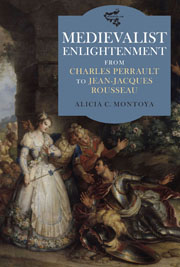Book contents
- Frontmatter
- Contents
- Dedication
- Acknowledgments
- Introduction
- I CONCEPTUALIZING THE MEDIEVAL
- 1 A Sense of the Past: Ancients, Moderns, and the Medieval
- 2 The Medievalist Rhetorics of Enlightenment
- II REIMAGINING THE MEDIEVAL
- III STUDYING THE MEDIEVAL
- Conclusion: Medievalism as an Alternative Modernity
- Bibliography
- Index
1 - A Sense of the Past: Ancients, Moderns, and the Medieval
from I - CONCEPTUALIZING THE MEDIEVAL
Published online by Cambridge University Press: 05 May 2013
- Frontmatter
- Contents
- Dedication
- Acknowledgments
- Introduction
- I CONCEPTUALIZING THE MEDIEVAL
- 1 A Sense of the Past: Ancients, Moderns, and the Medieval
- 2 The Medievalist Rhetorics of Enlightenment
- II REIMAGINING THE MEDIEVAL
- III STUDYING THE MEDIEVAL
- Conclusion: Medievalism as an Alternative Modernity
- Bibliography
- Index
Summary
This chapter argues that for early French Enlightenment authors, the medieval functioned not primarily as a historical concept, as it does for us today, but rather as a floating rhetorical category to which a precise content had yet to be ascribed. Modern ideas of the medieval as a discrete, closed-off period in history are themselves the product of discussions that took place, during the Enlightenment and at other historical moments, on the meaning and movement of history. Because the early Enlightenment's concept of moyen âge was different from the way we conceive of it today, this chapter will first backtrack through the debate on how authors understood the medieval, as a historical concept, to lay the groundwork for a subsequent discussion of early Enlightenment attitudes towards medieval literary productions specifically. I explore how and when authors developed a sense of the otherness of the medieval, and how concepts of the medieval were related to broader reflections on history and the possibility of historical progress. Was the medieval, in other words, conceived as such, and if so, what categories did early Enlightenment readers and writers use to describe this epoch and its relation to their own modernity?
In order to answer this question, we must in turn interrogate our own, twenty-first-century notions of history. Our modern perception of the medieval as a separate historical period is, essentially, dependent on the idea of historical evolution, as most forcefully conceptualized by nineteenth-century German historism. According to this idea, history progresses by leaving an increasingly distant past behind itself, and historical periods follow one another in an exclusively and exclusionary forwards-moving motion.
- Type
- Chapter
- Information
- Medievalist EnlightenmentFrom Charles Perrault to Jean-Jacques Rousseau, pp. 17 - 42Publisher: Boydell & BrewerPrint publication year: 2013



